Leading the world.




Graduate Resources







The Ontario Agricultural College (OAC) of the University of Guelph is recognized globally for its research excellence, teaching and knowledge extension in the broad areas of food, agriculture, communities and the environment
Established in 1874, OAC is a founding college of the University of Guelph It has two campuses in Guelph and Ridgetown, Ontario, and research activities are supported and strengthened by a province-wide network of field stations and research facilities
OAC is comprised of six academic units:
• Animal Biosciences
• Environmental Design and Rural Development
• Environmental Sciences
• Food, Agricultural and Resource Economics
• Food Science
• Plant Agriculture
“I invite you to explore OAC’s graduate programs and look forward to welcoming you to our community of world-class, innovative scholars! As a graduate student here, you will be inspired and engaged in discovery, knowledge generation, problemsolving, professional development and in making a significant contribution to your community and world around you. ”
Dr. Rene Van Acker Dean, Ontario Agricultural College\

OAC at the University of Guelph is well known for its warm and friendly campus atmosphere U of G is frequently ranked as the best university in the province for its student support, learning and living environment The university offers many opportunities for students to become involved in their community and gain leadership experience
#1 in Canada and #13 in the world for food sciences and technology*
Our community has a strong sense of shared purpose: To Improve Life by inspiring leaders, generating knowledge and creating innovative solutions for food, agriculture, communities and the environment.
\
\
\
#1 in Canada and #17 in the world for agricultural sciences**
#2 in Canada and #49 in the world’s top-notch universities in the field of plant and animal science**
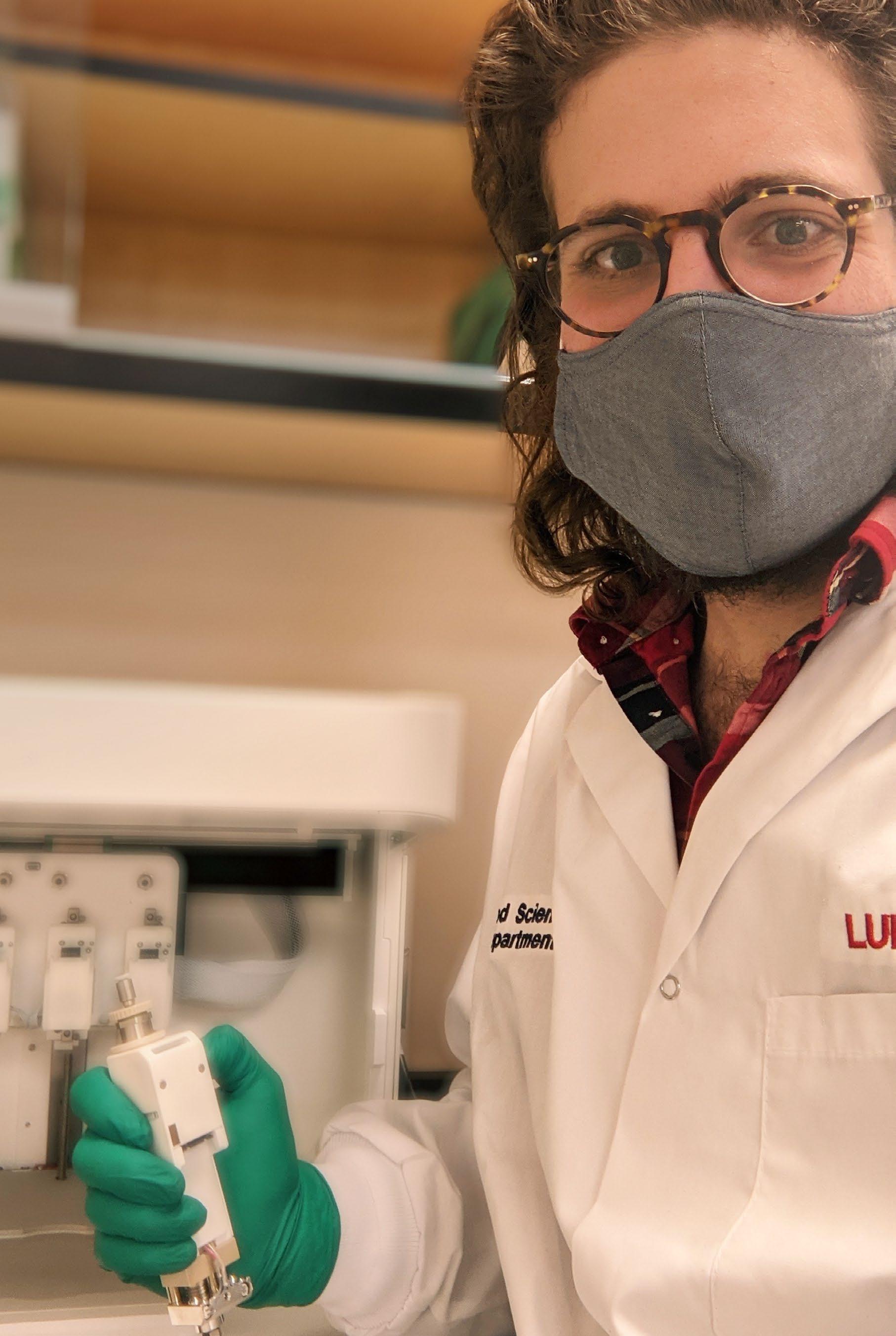
#3 in Canada and #50 in the world for environment/ecology*
**
*Source: news.uoguelph.ca/2020/07/u-of-g-programsrank-among-worlds-best/
The U S News’ Best Global Universities rankings
“If institution rankings, research opportunities, or learning from some of the top names in the field were things you are seeking in a prospective university, look no further than OAC.”
Louis Colaruotolo PhD, Food Science Current Student
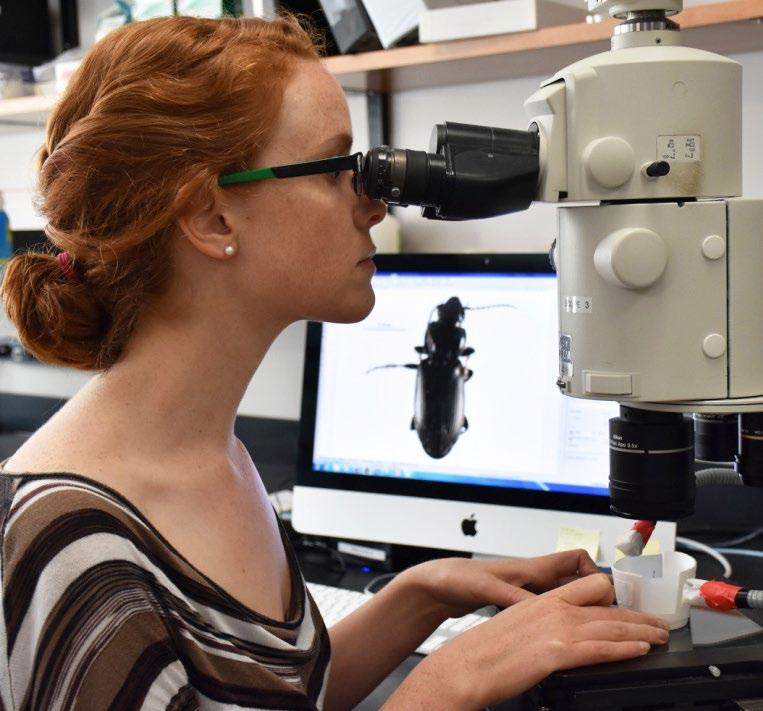
U of G is one of the country’s most research-intensive universities and ranks as one of Canada’s top comprehensive research institutions
It is internationally regarded as a research leader, with research impact around the globe
International in reputation, global in reach.
OAC’s research activities play a significant role in the University’s research profile The College is recognized around the world for its research expertise in the areas of plant and animal production, sustainability and welfare, community and policy development and environmental studies and solutions
OAC sits at the heart of an ever-growing agri-food industry that employs more than 800,000 people in the province OAC delivers research, education and laboratory services in collaboration with many governmental partners such as the Ontario Agri-Food Innovation Alliance aiming to further the long-term global competitiveness and sustainability of Ontario’s agriculture and food system
OAC is committed to internationalism and creating global citizens. Our researchers and scholars lend their expertise to solving global problems and creating opportunities to improve lives abroad.
• Soil health, climate change and sustainable agriculture through initiatives such as the new Soil Health Interpretive Centre (SHIC) and NSERC funded Climate-Smart Soils CREATE led by Dr Claudia Wagner Riddle (School of Environmental Sciences)
• Improving food efficiencies and lowering methane emissions with genomics Dr Angela Canovas (Department of Animal Biosciences) identified specific functional markers in dairy cows for feed efficiency, these cows consume the same amount of feed than other cows, converting it into increased milk production while producing less methane
• Dr Keith Warriner (Department of Food Science) and post-doctoral researcher Mahdiyeh Hasani received the 2020 Innovation of the Year Award for repurposing their food disinfection technology to clean personal protective equipment (PPE) during the COVID-19 pandemic
• Dr Ryan Gibson and postdoctoral fellow Dr Hernandez -Gongora (School of Environmental Design and Rural Development) led the creation of the Provincial-Ter ritorial-Federal Rural Policy Working Group a collab orative network of rural policy analysts to collect and share knowledge, and advance discussions on rural policy implications
• Dr Sheri Longboat (SEDRD) and colleagues in the College of Social and Applied Human Sciences and the College of Arts are developing Nokom’s House, an Indigenous land-based learning lab in the Arboretum Learn more about Nokom’s House: watch video here
Graeme Reed has been named among the national 2020 top 30 under 30 sustainability leaders in Canada by Corporate Knights. His thesis, entitled Indigenous climate futures: Developing alternative visions for naturebased climate solutions, explores how Indigenous solutions can generate selfdetermined futures in the face of catastrophic change.

Graeme Reed PhD, Rural Studies
Current Student Assembly of First Nations Senior Advisor
OAC has exceptional researchers, as demonstrated by our 5 Canada Research Chairs (CRC).
In addition to our Canada Research Chairs, OAC is home to NSERC Industrial Research Chairs and many Donor & Partner Supported Chairs and Professorships
To support research being performed at OAC, our researchers have access to cutting-edge facilities and many Research Centres and Institutes, such as:
• The Arrell Food Institute
• Aquaculture Centre
• Bioproducts Discovery and Development Centre (BDDC)
• Campbell Centre for the Study of Animal Welfare (CCSAW)
• Canadian Research Institute for Food Safety (CRIFS)
• Centre for Agricultural Renewable Energy and Sustainability (CARES)
• Centre for Genetic Improvement of Livestock (CGIL)
• Centre for Land and Water Stewardship
• Centre for Nutrition Modelling
• Controlled Environment Systems Research Facility (CESRF)
• Dairy at Guelph
• Gosling Research Institute for Plant Preservation (GRIPP)
• Guelph Centre for Urban Organic Farming
• Guelph Turfgrass Institute
• Honey Bee Research Centre
• Institute for the Advanced Study of Food and Agricultural Policy
Check out our faculty and the research they perform!

OAC Faculty List and Areas of Study
Advance your career with access to a network of world class research facilities.
Research Centres and Institutes provide graduate students with hands-on experience and access to state-of-the-art equipment and facilities as they complete their PhD and Master’s research The research conducted at these centres promote agri-food discoveries, validate laboratory findings, stimulate further research and provide valuable information for the agri-food sector and beyond
Learn more about OAC’s research in The Why & How Podcast




New, iconic facility focused on supporting honey bee health.

OAC will be home to a new, $12-million facility, that with be a ‘hive’ for all things related to honey bee health research, education, advocacy and outreach #UofGHoneyBees

Learn More Watch Video Here
The Government of Ontario announced that the Ontario Swine Research Centre will join the world-class Ontario Dairy Research Centre and Ontario Beef Research Centre at the Elora Research Station, making this cluster of facilities the epicenter of livestock research in Canada.
“OAC is home to an amazing range of programs and research initiatives — from pollinators to planning, craft beer to crop science, broadband to bovines, and everything in between, you’ll find someone exploring important questions within OAC.”
Ashleigh Weeden PhD, Rural Studies Current StudentDr. Christine Baes, CRC in Livestock Genomics Dr. Kari Dunfield, CRC in Environmental Microbiology of Agro-ecosystems Dr. Trevor DeVries, CRC in Dairy Cattle Behaviour and Welfare Dr. Alejandro Marangoni, CRC in Food, Health and Aging Dr. Michael Rogers, CRC in Food Nanotechnology
OAC has 17 master’s degrees thesis and course-based options and 10 PhD programs that focus on food, agriculture, communities and the environment, housed within six departments and schools
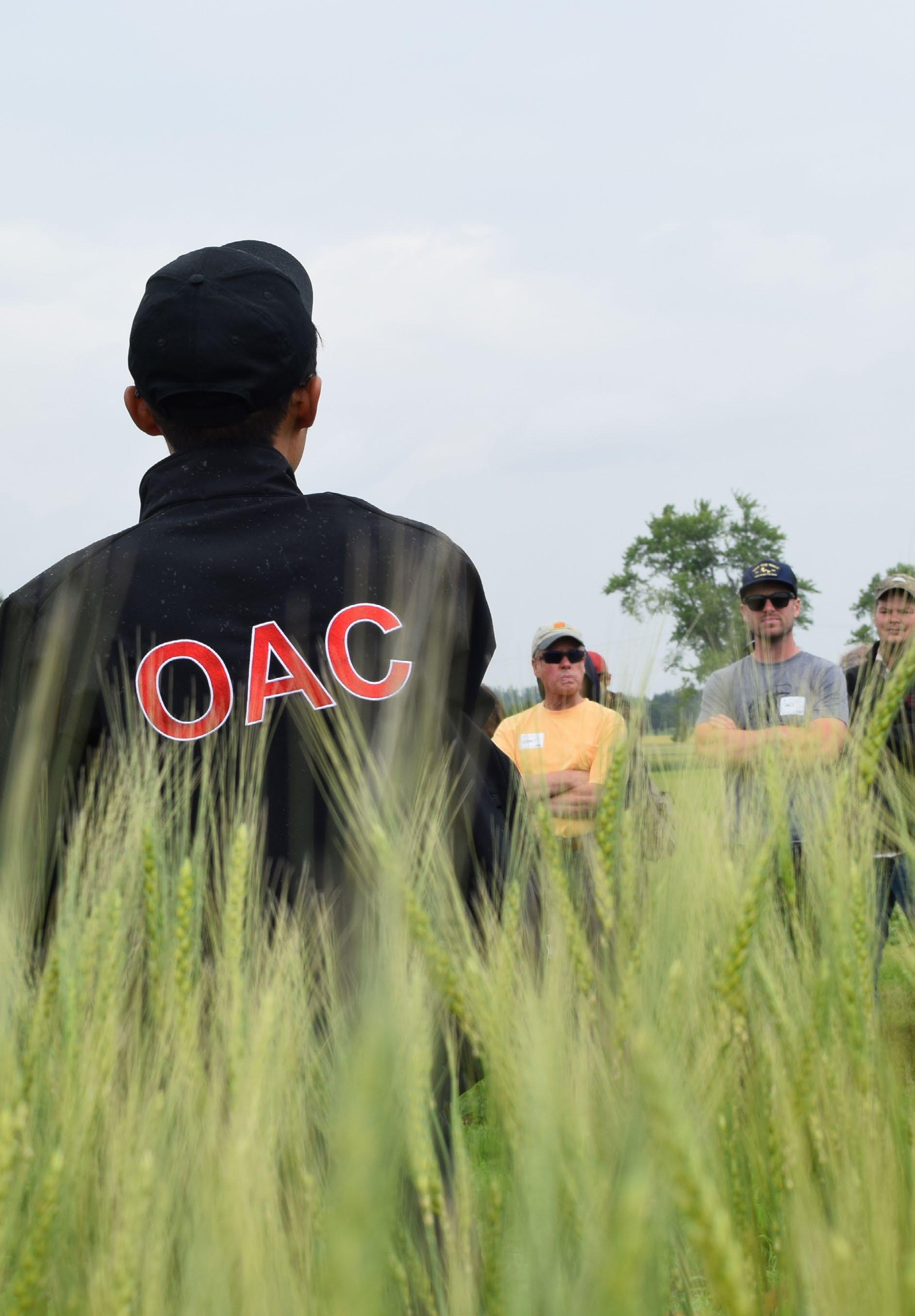

• ~2 years of full-time study*
• Research focused (minimal coursework)
• Submission of a thesis that contributes a novel tool or theory in a specific research area Research conducted is an in-depth analysis of a scientific topic and could become a published paper
• Finding a faculty advisor recommended prior to program application
• 1 year of full-time study
• Coursework focused to develop a reasonable mastery of a specific area of study
• Faculty advisor not required prior to application
• 1–2 years of full-time study
• Combination of coursework and a major research project (MRP)
• A MRP is smaller in scope than a thesis project The research does not need to be a novel contribution, but still thoroughly researched
• Faculty advisor may be required prior to program acceptance
• ~4 years of full-time study*
• Research intensive
• Submission of a thesis that is a major contribution to the discipline Research focus on a novel tool or theory in a specific research area
• Finding a faculty advisor recommended prior to program application, required prior to acceptance
• Optional Direct Entry transfer from master’s degree into a doctoral program
*Some disciplines may take longer to complete
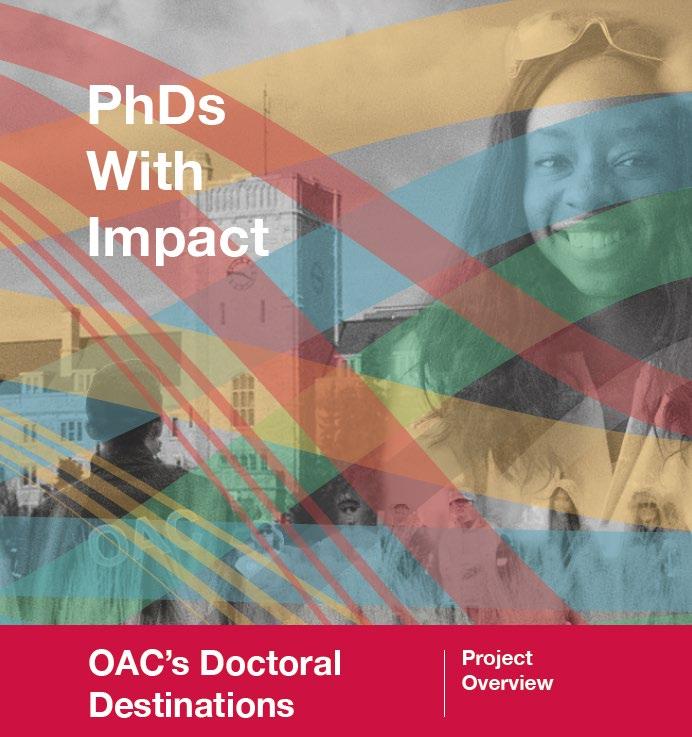
The OAC Doctoral Destinations Project documents graduates from OAC’s PhD programs from 1999 to 2019 and their career status as of 2019 By identifying the career pathways of our PhD graduates, we are able to illustrate their broad aptitudes and the many ways in which they have applied their educational and research experience to a variety of careers
Explore the Doctoral Destinations Project Report Project Overview Report
Department of Animal Biosciences*
MSc Animal Biosciences PhD Animal Biosciences
Department of Plant Agriculture* MSc Plant Agriculture PhD Plant Agriculture
Department of Food Science*
MSc Food Safety and Quality Assurance PhD Food Science
MSc Food Science
Master of Dairy Technology Management (MDTM)
Department of Food, Agricultural & Resource Economics*
Master of Food, Agricultural and Resource Economics (MFARE)
MSc Food, Agricultural & Resource Economics
School of Environmental Design & Rural Development*
PhD Food, Agricultural & Resource Economics
School of Environmental Sciences*
MSc Capacity Development and Extension PhD Rural Studies
Master of Landscape Architecture (MLA)
MSc Rural Planning & Development
Master of Rural Planning & Development (MPLAN)
Master of Environmental Sciences (MES)
MSc Environmental Sciences
Collaborative Specializations: International Development Studies Neuroscience One Health Toxicology
Delivery Options: Course Work Thesis Online
PhD Environmental Sciences
(can be added to a participating degree program) Description
International Development Studies
This collaborative specialization provides a focal point for graduate teaching and research in the area of international development that combines training in a particular discipline with exposure to a broad range of social science perspectives
Neuroscience
One Health
Toxicology
A collaborative specialization that fosters strong collaborative efforts between faculty and students working across various levels of analysis, including molecular, cellular, systems, and behavioural research
This collaborative specialization prepares future leaders for the complex challenges at the confluence of human, animal, and environmental health, working across disciplinary boundaries, conducting multidisciplinary research, mobilizing knowledge, and informing policy
This collaborative specialization encompasses broad and diverse fields of study such as ecosystem health, including water, air and soil quality, plant health, microbes, and insects, sustainable agriculture and human and animal health
Reseach and educational programs in the Department of Animal Biosciences revolve around the basic sciences relevant to animal development and well-being
• Animal Breeding and Genetics
• Animal Nutrition
• Animal Physiology
• Animal Behaviour and Welfare
Students and faculty have access to high quality animal research facilities, a modern and federally inspected meats laboratory, and a range of laboratory facilities in genomics, nutrient analyses, physiology, and microbiology
The department also has unique on-campus large farm animal study rooms and surgical recovery facilities for animal research
Students are very successful after they graduate Within 6 months of graduating, over 90% of Animal Biosciences graduates go on to future training or careers related to their program

Find out more about our faculty here
There are two ways to complete your master’s program within the Department of Animal Biosciences: MSc by course work or MSc by thesis
The MSc coursework is a 1-year program for specialized training in different aspects of the animal sciences
The MSc by thesis program is a 2-year program designed for students interested in advanced research
The innovative research conducted ranges from the applied (designed to solve practical problems in animal agriculture) to discovery-focused, cutting-edge research aimed at testing fundamental hypotheses in animal biology
Find out more about our research here
Interested in a PhD program? Find out more here
Find out more about our PhD program here
Graduate programs offer “hands on” experiential learning opportunities for research with a large selection of livestock animals, equine, companion animals, wildlife, aquatic and more to complement a wide range of graduate courses.

“I work with some very exciting and sometimes unpredictable animals, and I get to work with some very exciting and sometimes unpredictable graduate students! We have a lot of fun in our lab. We do a lot of varied work and research, and it’s that variability that I think makes it so exciting for me and for the people I work with.”
Find out more about Dr. Pearson here
Physiology of equine diseases, cartilage biology, nutraceuticals
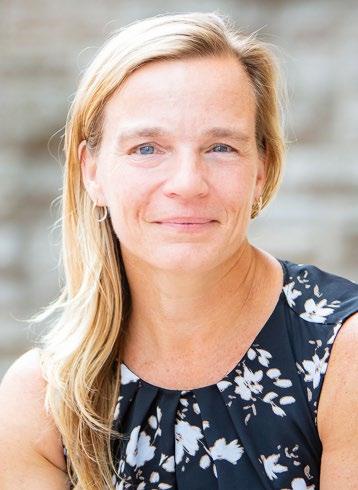
Dr. Wendy Pearson Associate Professor
“Not only is graduate school an awesome experience, but completing a graduate degree is an excellent way to differentiate yourself and make you more desirable for potential employers. The soft skills you develop during graduate school such as teamwork, communication, problem solving, and critical thinking are skills that are not necessarily developed during your undergraduate degree.”Natalie Asaro MSc, Companion Animal Nutrition Alumni Nutrition Manager, Petcurean Pet Nutrition
The School of Environmental Design & Rural Development (SEDRD) reflects the imperatives in building authentic communities where planners, leaders, communicators, landscape architects, the citizens and politicians all play important interdependent roles in community strength
• Capacity Development and Extension
• Landscape Architecture
• Rural Planning and Development
• Rural Studies PhD
Find out more about our faculty here
This program is unique in Canada and focuses on processes of learning, advocacy, leadership, communi cation and capacity development for for rural, remotes and small communities in Canada and around the world Students develop core competencies for facili tating social and environmental change In addition to coursework, students write either a thesis or major research paper The thesis option requires the completion of 6 courses in addition to the thesis, while the major paper option requires the completion of eight courses and the major research paper
Find out more about CDE research here
This program is for people seeking a graduate degree in an intensive, internationally-recognized design program
The MLA program is unique in being an accredited graduate degree in landscape architecture, as well as Canada’s first-established professional degree program in landscape architecture

The MLA curriculum has three integrated streams: design theory and practice, landscape analysis and planning, and research inquiry and application The final year of the MLA program is focused on the individual interests of each student and on completion of a master’s thesis Internships and summer employment opportunities provide students with paid professional experience in some of North America’s most prestigious firms
Find out more about MLA research here
“Communication and learning are rarely central but entirely fundamental to agricultural innovation, socio-economic and environmental well-being, and ultimately, the sustainability of all life on Earth. I enjoy working with graduate students who are scholar-practitioners taking a system view on local and global challenges.”

Find out more about Dr. Hambly here

Dr. Helen Hambly Professor and Project Lead Regional and Rural Broadband project Global agriculture and rural research and development; communication and innovation processes
“As an MLA graduate student, you will feel the benefits of smaller class sizes, where professors/instructors know your name, are accessible, and make themselves available to their students, ultimately to see them succeed.”
Courtney Plato MLA Master of Landscape Architecture Alumni NAK Design Strategies Project Coordinator
Within the Rural Planning & Development program there are two graduate degrees: a Master of Science in Rural Planning and Development (MSc) and Master of Plan ning (MPlan) Both programs provide the opportunity for graduate study, research and professional development in rural planning and development in either Canadian or international contexts

This 2-year program is intended for students with a completed undergraduate degree interested in planning and development Students focus their program of study in either the Canadian or International stream The program can be completed with a thesis, major research paper, or as a course-based option The MSc program is an accredited degree by the Professional Standards Board, facilitating membershipin the Canadian Institute of Planners and provincial planning organizations Find out more about Planning research here
This 1-year program is intended for students with a completed undergraduate degree and 4 5 years of planning and development experience, who wish to upgrade their professional training to the Masters level without necessarily withdrawing from the work force
The MPlan program is offered in-class or via online learning, and offers students the opportunity to specialize in either the Canadian or International stream

The focus is on rural, Indigenous, and remote com munities in Canada Students gain critical knowledge and skills sets in planning theory, planning law, plan formation, implementation, project management, and evaluation These skills are developed and demonstrated through community-based course projects, casestudies, and student research
Interested in a PhD program? Find out more here
Find out more about our PhD program here
“Through my research I have been able to explore and speak to unique individuals. I have spoken to elders that have essentially never left their communities or land. I get to talk to them about where they were born, what they ate, and the changes they’ve seen over time. What an immense privilege that it is to talk to people who see the world in such a unique way.”
Latornell Professor in Environmental Stewardship

Community-based conservation, natural resource governance and sustainable community development
Prepares students for practice and research in rural and regional development planning in the international context It focuses on the rural regional dimension within a national or global context, in particular the policy, planning and management processes that are driving development interventions It emphasizes applied research and practice based on a firm foundation of theory
The Rural Studies PhD provides opportunities for advanced studies and research on the integration of socio-cultural and bio-physical components of capacity development, design, or planning of landscape systems and rural communities Graduates become leading specialists in addressing sustainable landscapes and issues related to rural communities
Graduate Program Assistant contact Lorena Barker rsphd@uoguelph ca
Dr. Nicolas Brunet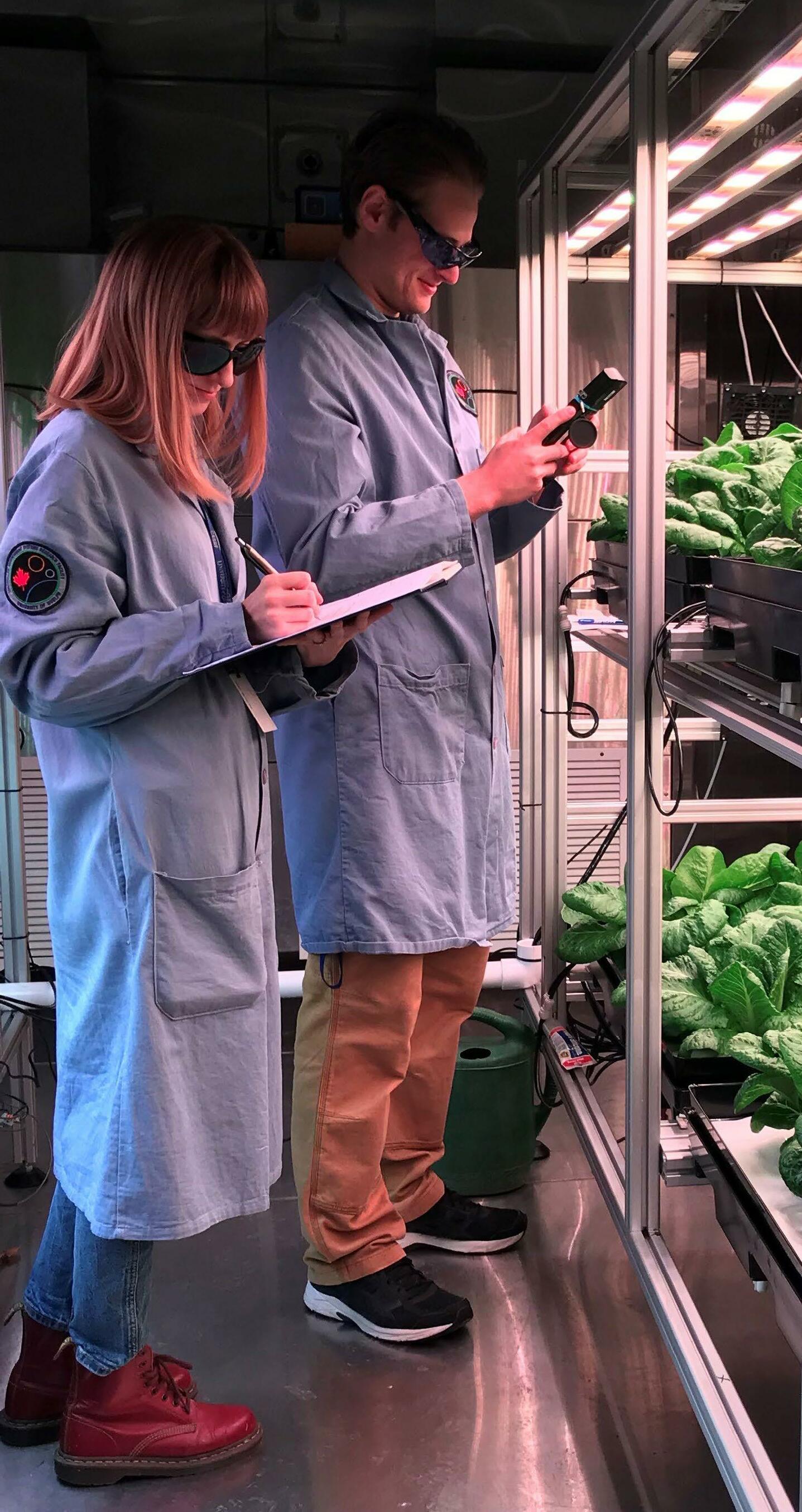
• Earth and Atmospheric Science
• Ecosystem Science and Biodiversity
• Plant and Environmental Health
a difference
The
Degree
Award winning faculty and research expertise spans several disciplines including apiculture, atmospheric and earth sciences, ecology, entomology and pest manage ment, environmental microbiology, plant pathology and protection, soil science, and environmental toxicology
Find out more about our faculty here
This program focuses on the most recent theoretical and technical advances in environmental science, through interdisciplinary and multidisciplinary teaching and research, to provide students with both a depth and breadth of knowledge Students will develop critical thinking and communication skills so that they can excel in a career with industry, government or in the not-for-profit sector
Admission
Application
“The real benefit of completing post-graduate work is not the knowledge you obtain from the degree, but the skills and confidence you gain by completing something so difficult to obtain. By achieving a post-graduate degree, you demonstrate to future employers these traits. Material can be learned anywhere, the skills you develop in graduate school are earned.”
Brandon Yep MSc, Environmental Sciences Alumni Canopy Growth Corporation Extension Agronomist
degree
The objective of this thesis-based program is to develop graduates with a high level of knowledge and expertise in specific aspects of environmental science, training in laboratory and field techniques, and excellence in written and oral communication Graduates will possess a strong foundation on which they can be highly successful in science-related positions in government, industry, and consulting, or carry out high quality research at the PhD level
Find out more about our research here
Interested in a PhD program? Find out more here
Find out more about our PhD program here
“When working as an agrometeorologist I had the opportunity to visit the University of Guelph campus. My short visit inspired me to pursue my PhD in the School of Environmental Sciences, where I have stayed ever since! I really enjoy all aspects of my work: teaching, research and contributing to my scientific community.”
Find out more about Dr. Riddle here
Dr. Claudia Wagner Riddle ProfessorGraduate Program Assistant contact ses gradsec@uoguelph ca

Graduate students in the Department of Food, Agricultural & Resource Economics (FARE) study issues related to trade, policy, resources and new technologies The scope of study incorporates all parts of the food system from farm to fork
• Food and agricultural economics
• Natural resource and environmental economics
Students apply their rigorous training and research experience in a number of rewarding ways Through their research, students gain an appreciation of the policy environment within which provincial, federal and private organizations exist, and are prepared for successful careers in the government, academia and private sectors upon graduation
Find out more about our faculty here

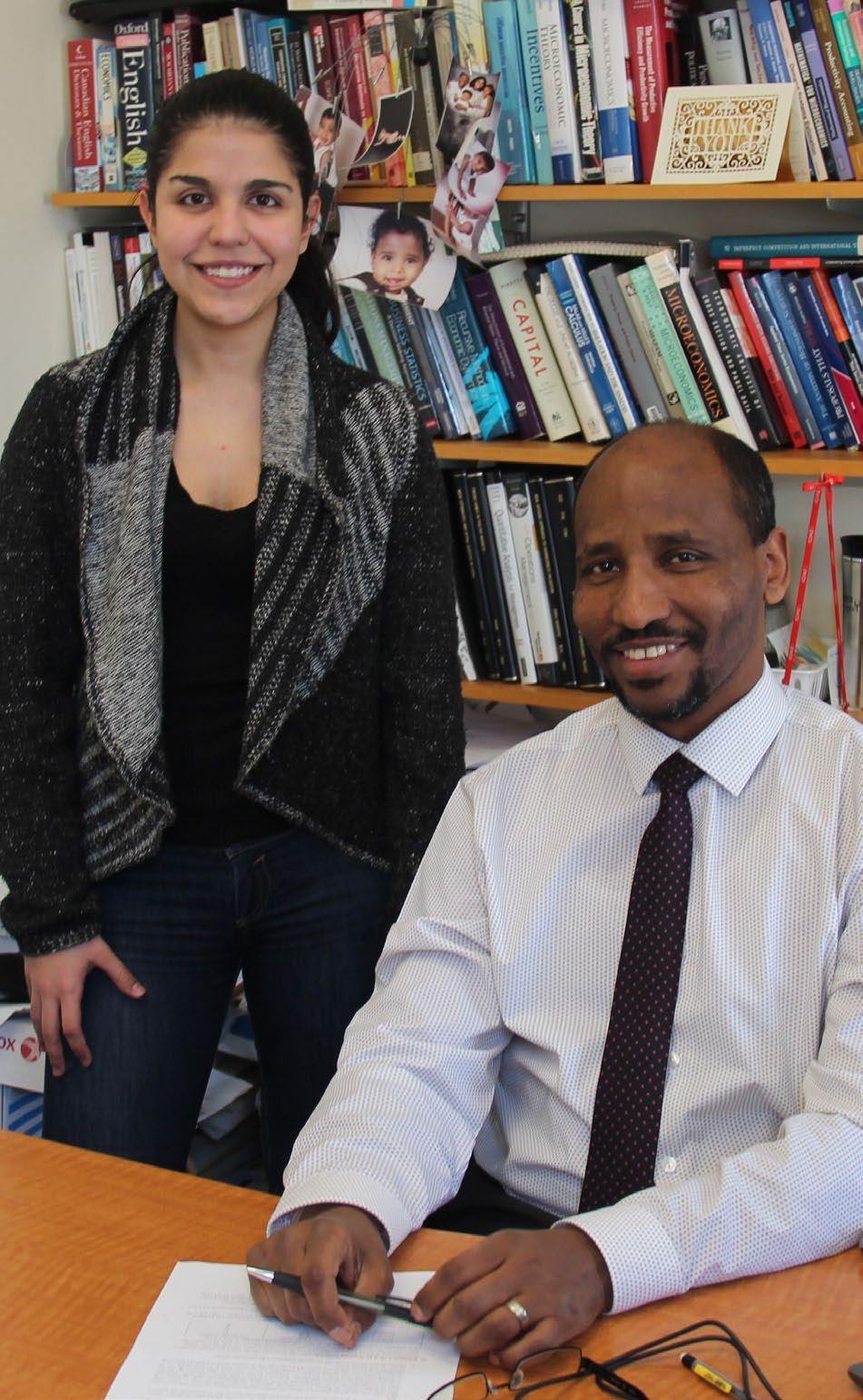
This course-based program provides graduate education related to the economics of food, agriculture, and natural resources, with an emphasis on skills acquisition and development of industry-specific expertise
A research option is available to add onto this program MFARE students are eligible for funding, but it is not guaranteed
FARE has strong links internationally. Graduate students in the department are drawn from North America, Europe, Latin America, Africa and Asia. The multicultural nature of the graduate student body enriches the experience of both students and faculty in the department.
Funding
Degree Requirement
Admission Requirement
degree
degree
economics
The MSc develops fundamental understanding of economic principles and their application in identifying and solving relevant problems related to food, agriculture, and natural resources The program develops appro priate analytical, methodological, and communication skills for students to analyze agriculture and resource problems effectively and explain their findings
Find out more about our research here
Find out more about our PhD program here
Graduate Program Assistant contact Kathryn Selves
“Agriculture is at the nexus of a lot of major social issues; poverty, health issues, and the environment. In each of those issues agriculture plays a major role. My research looks at the effects of new technology and government policy on farmers decisions, and the impact of those decisions on the environment and markets.”
Find out more about Dr. Weersink here
Agricultural economics; economic impacts of new technology and government policy on agricultural structure

Dr. Alfons Weersink Professor
“I would highly recommend pursuing a graduate degree from the OAC since it builds a solid foundation for you to explore many different career paths. I have had the opportunity to work in both public and private sectors because of my research in the OAC.”
Karthik Nadelle MSc, Food, Agricultural & Resource Economics Alumni Partnership Analytics RBC Ventures
For the future leaders of the dairy industry.
The Master of Dairy Technology Management (MDTM) program, a new collaborative program launching Fall 2022, aims to produce the highly qualified personnel needed to lead the growing local, national and international dairy industries into the future
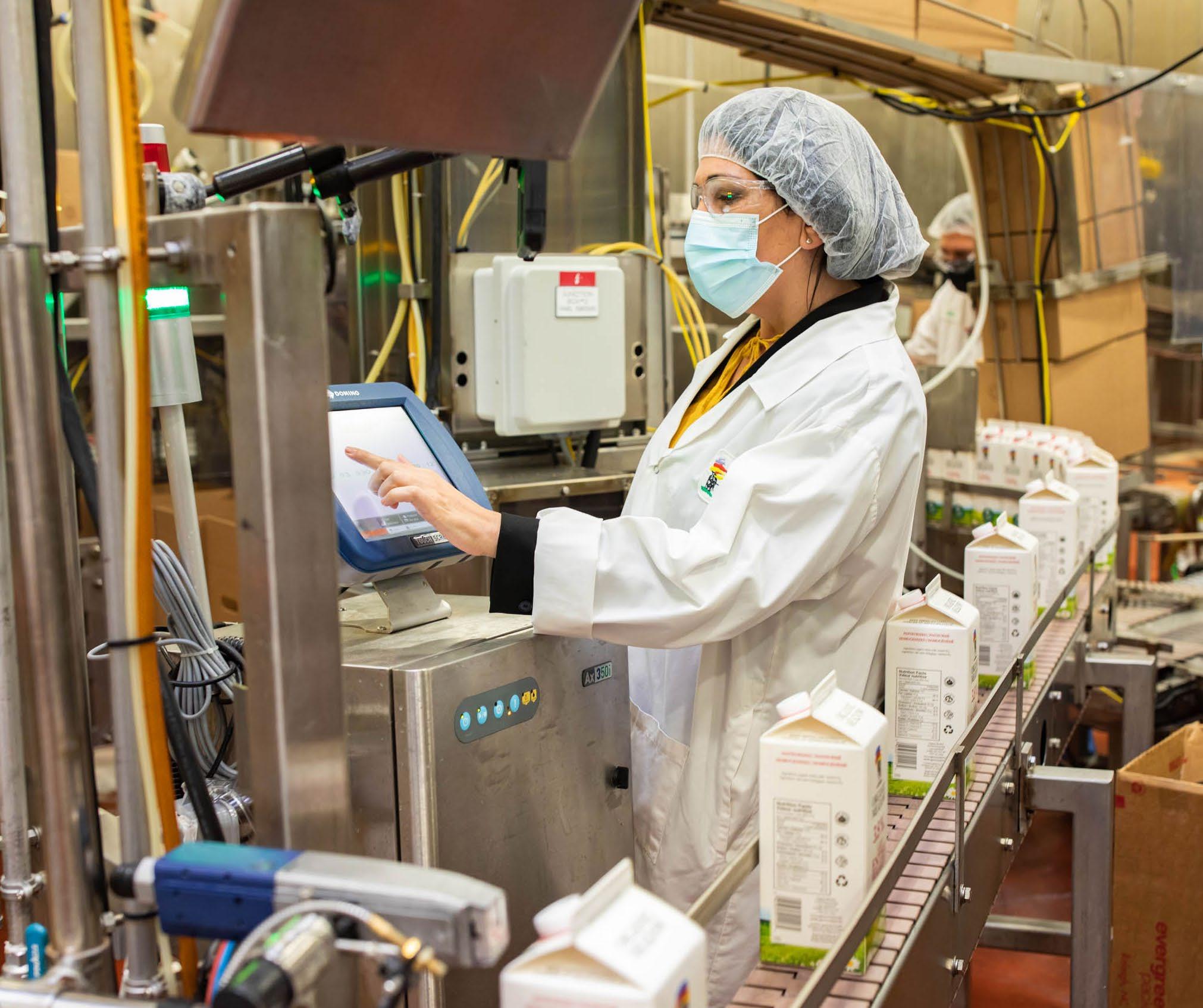
This unique program provided by the Departments of Food Science and Food, Agricultural & Resource Economics, brings together global expertise to delve into the essentials of dairy science, dairy plant operations, dairy products, agri-food economics, food safety and quality management, operations management, and supply and value chain management
The Master of Dairy Technology Management is an interdisciplinary program that blends three major overarching competencies:
• Dairy Science and Technology
• Management of Operations, Food Safety Systems and Quality Assurance
• Marketing and Business Management
Designed to optimize accessibility, this course is delivered fully online
The concentrated curriculum can be completed in 1 year with a full-time course load, or taken part-time over 2–3 years
The program consists of 6 courses and a major capstone project:
• International Food Industry and Policy Analysis
• Assessment of Food and Agricultural Technologies
• Dairy Chemistry and Microbiology
• Dairy Products and Processes
• Dairy Technology Management Projects
Find out more about this program here
Graduate Program Assistant contact Kay Norwell mdtm@uoguelph ca
With a focus on developing sustainable, safe and innovative foods aimed at improving human health, the Department of Food Science conducts interdisciplinary research spanning the fields of chemistry, biology, microbiology, natural product chemistry, nanoscience, physics and nutritional science
• Food Production
• Food Nutrition
• Food Microbiology
• Food Chemistry
The Food Science program at OAC is the only one of its kind in Ontario and has trained a large percentage of the food scientists currently employed in Ontario’s food and beverage industry; the third largest in North America
Facilities include individual laboratories, teaching laboratories, a core laboratory (focusing on analytical chromatography), a state-of-the-art dairy processing plant, an experimental kitchen, a newly renovated food processing facility and a level II biosafety facility
Meet our Food Science faculty here

Find out more about our PhD program here
Degree Requirement Honours bachelor’s degree in sciences (with courses in food science, nutrition, public health or other related fields)
Admission Requirement
Honours BSc degree in Food Science, Chemistry, Biology, Microbiology, Physics, or other related degree
An MSc degree

This course-based graduate program is designed to provide a balance of scientific and management principles underlying Food Safety and Quality Assurance
This program is intended for those currently employed as food scientists, food engineers, public health or food safety inspectors, as well as those who have recently graduated from programs with appropriate scientific backgrounds Students may take this program in one of two formats: a combination of online and on campus courses with a faculty advisor-led research project; or fully online with an approved workplace project
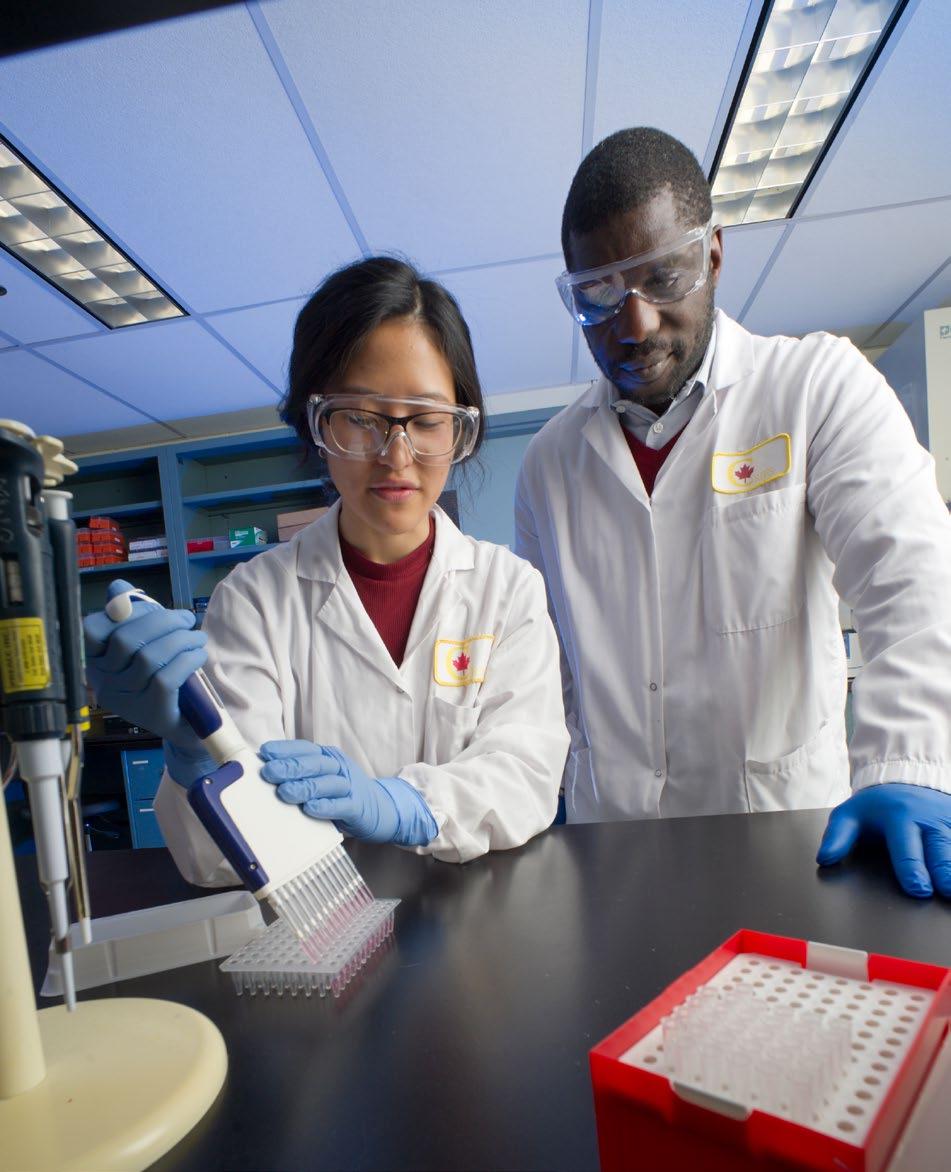
Minimum of 73% (B) during last two years of undergraduate study
Application Deadline July 1 (Domestic applicants) November 1 (International applicants)
Minimum of 73% (B) during last two years of undergraduate study
July 1 (Fall), November 1 (Winter), March 1 (Summer)
A minimum of 73% (B) average
July 1 (Fall), November 1 (Winter), March 1 (Summer)
Entry Fall Fall, Winter, Summer Fall, Winter, Summer
Graduates will gain general scientific knowledge as well as a more in-depth understanding of various aspects of food science Extensive laboratory and technical training is obtained by conducting experiments under the supervision of world-renowned faculty
Find out more about our research here
Graduate Program Assistant contacts
FSQA Program Assistant Kay Norwell
ca
MSc and PhD Program Assistant Tricia Townsend Tricia townsend@uoguelph ca
“Our relationship with food is such a vital component of our health and microbes play a big role in how to diversify our food and maintain a healthy gut ecosystem”. Find out more about Dr. LaPointe here
Dr. Gisele LaPointe Professor NSERC/Dairy Farmers of Ontario Industrial Research Chair in Dairy Microbiology Improving the quality and functionality of food
“Coming from an industrial field of food safety leadership, I found the course outline to be intriguing and was confident this master’s program would boost my existing skills and moreover help me get a global exposure on food safety and learn new skills.”
Vijay Issac MSc, Food Safety & Quality Assurance Current Student
Whether fresh fruits, vegetables or meats, frozen foods, dairy products, cereals or beer and wine, food scientists have transformed these products from raw ingredients to consumer goods.

Strongly rooted in crop science and horticultural science, graduate studies within the Department of Plant Agriculture encompasses applied bioinformatics; molecular genetics; genomics; field, horticultural and greenhouse crops; plant breeding; turf and grassland studies; environmental sustainability; weed science/ecology; and the use of plant materials for health, fibers and industrial products
MSc ( Thesis) PhD
Duration 2 years 3–5 years
Advisor Required at Application
Funding
Degree Requirement
honours bachelor’s degree in a plant science or biology program (or equivalent)
degree by thesis in a field
to the proposed area of specialization
Admission Requirement
• Plant Breeding and Genetics
• Plant Biochemistry and Physiology
• Crop Production Systems
• Bioproducts
The Department of Plant Agriculture has modern labs with state of-the-art equipment and access to controlled environment growth facilities and numerous field sites distributed over Ontario Graduate students are provided hands-on learning opportunities from nationally and internationally recognized experts
Find out more about our faculty here
This two-year program requires students to complete a research-based thesis with a specialization in one of four broad fields within plant science Students develop an understanding of plant growth and development, weed control, and plant-environment interactions Research for one’s thesis could focus on how to increase plant production efficiency, development of new crop varieties, or discovering new environmentally friendly industrial materials
Find out more about our research here
Interested in a PhD program? Find out more here
Find out more about our PhD program here
minimum of
average during last two years of undergraduate study
Application Deadline
Entry Fall, Winter, Summer Fall, Winter, Summer
average
Canada’s largest and most diverse applied plant biology department and the largest research department at the University of Guelph.
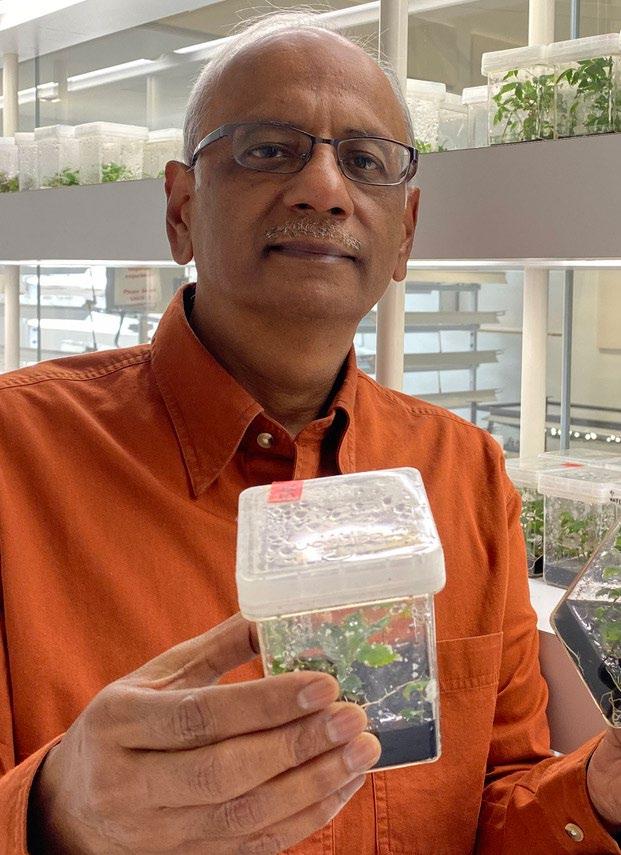
Graduate Program Assistant contact Tara Israel pgrad@uoguelph ca

Find out more about Dr. Saxena here
Regulatory signals modulating plant development and stress, in vitro propagation
“As the Director of the Gosling Research Institute for Plant Preservation (GRIPP), I get to work with graduate students interested in plant development, new plant products and crops, and international research programs in collaboration with other renowned institutes all over the world.”
Dr. Praveen Saxena Professor Director of the Gosling Research Institute for Plant Preservation
“By joining the Department of Plant Agriculture, I knew I would be in a supportive environment where I could receive first-hand experience working with farmers, as I want to do everything I can to support Ontario producers. ”
Erika DeBrouwer MSc, Plant Agriculture Alumni Ontario Ministry of Agriculture, Food and Rural Affairs Tree Fruit Specialist
OAC is committed to improving access to education and encouraging student wellness by creating an environment that supports and nurtures the student as a whole
Cost of Tuition/Living
“I have found studying at the OAC to be very supportive as the department does its best to identify new grants, trainings and flexible learning to make education accessible to all, especially for women with diverse systemic barriers.”
Victoria Agyepong MSc Rural Planning and Development Current Student Skills for Change of Metro Toronto Supervisor, Labour Market Analysis and Employer Engagement

OAC prides itself in attracting and recruiting the best students by acknowledging and rewarding their accomplishments
As a research-intensive institution, we place great importance on helping students finance their education We seek to allow students to devote their full energy to the successful completion of their program and strive to ensure that stable funding is available
To support these commitments, OAC’s programs offer a minimum stipend, a significant range of scholarships, bursaries, awards and travel grants, as well as other funding opportunities Some funding is awarded upon admission to a program or is based on recommendations from the admitting program
Thesis-based graduate students receive a funding package made up of a number of components such as some or all of the following: Graduate Stipend, Graduate Teaching Assistantships (GTAs), Graduate Research Assistantships (GRAs), Graduate Service Assistantships (GSAs), plus scholarships/awards (internal or external)

Students must apply directly for internal OAC Awards, and University Awards A comprehensive listing of University of Guelph internal graduate awards is available on the Graduate Award Search page
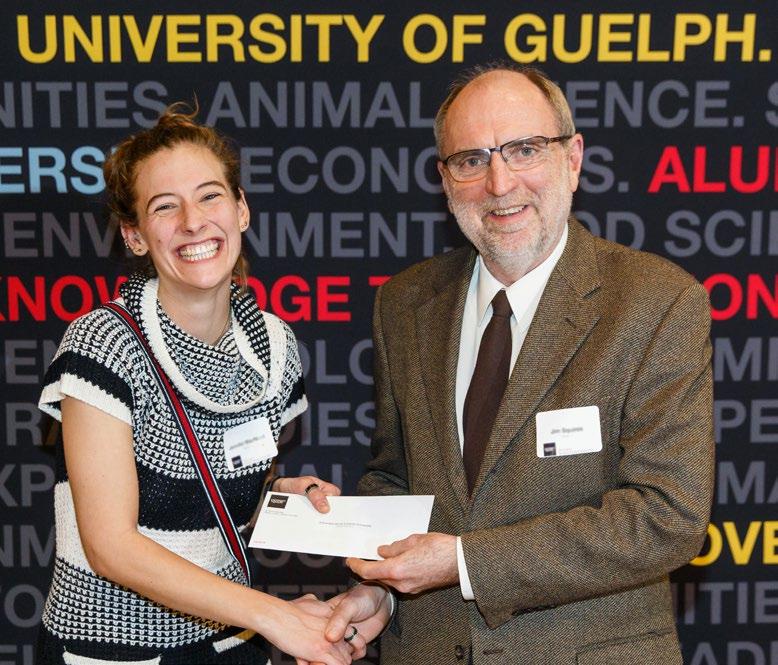
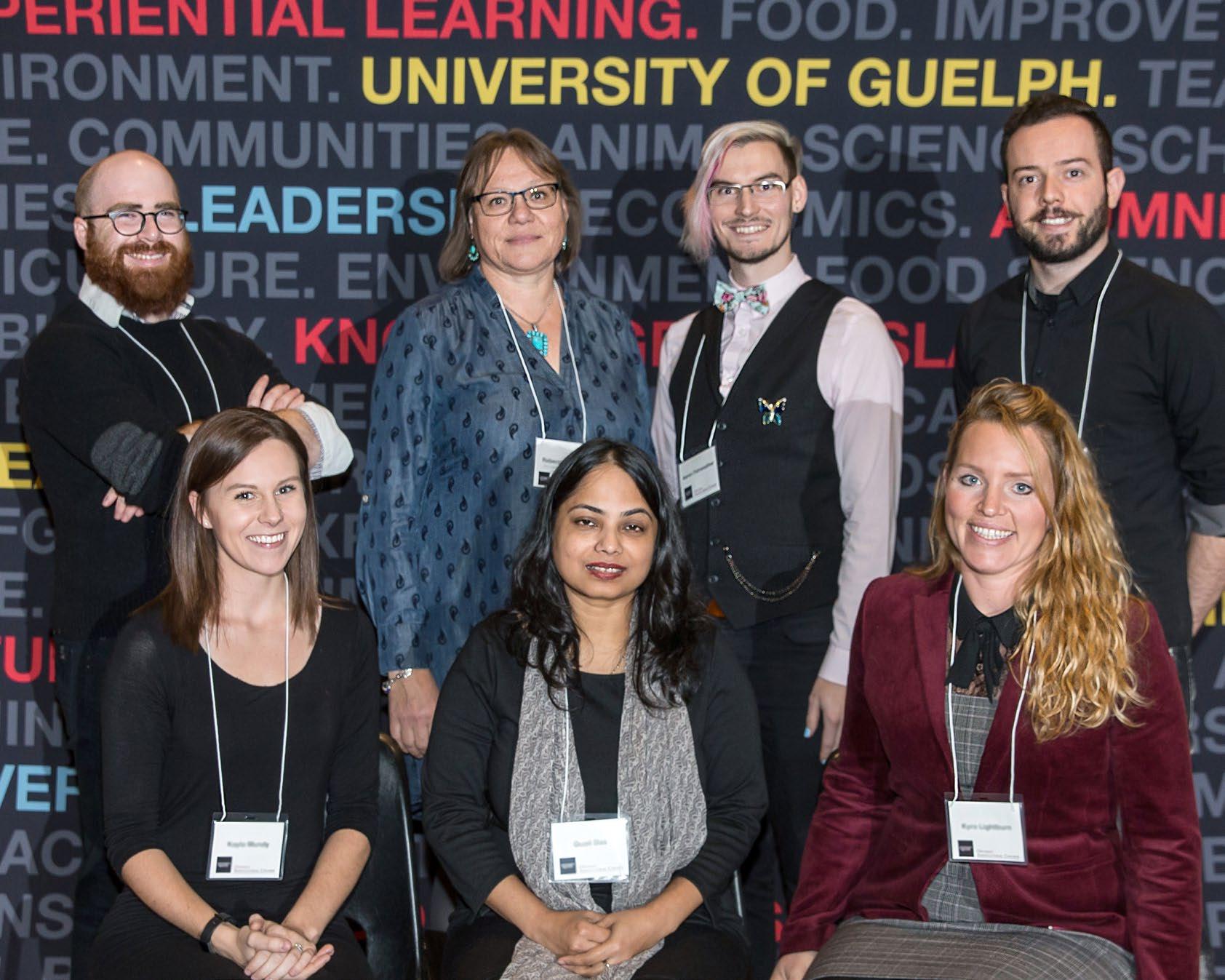
OAC graduate students are also highly successful in receiving external scholarships Graduate students in OAC are encouraged to review and apply to various external scholarship opportunities
Find out more about applying for Scholarships here
OAC awarded $3,025,000 in Scholarships and Awards to OAC Graduate Students in 2019/2020. Over half of OAC graduate students hold at least one award thanks to the generous support of our alumni and donors.
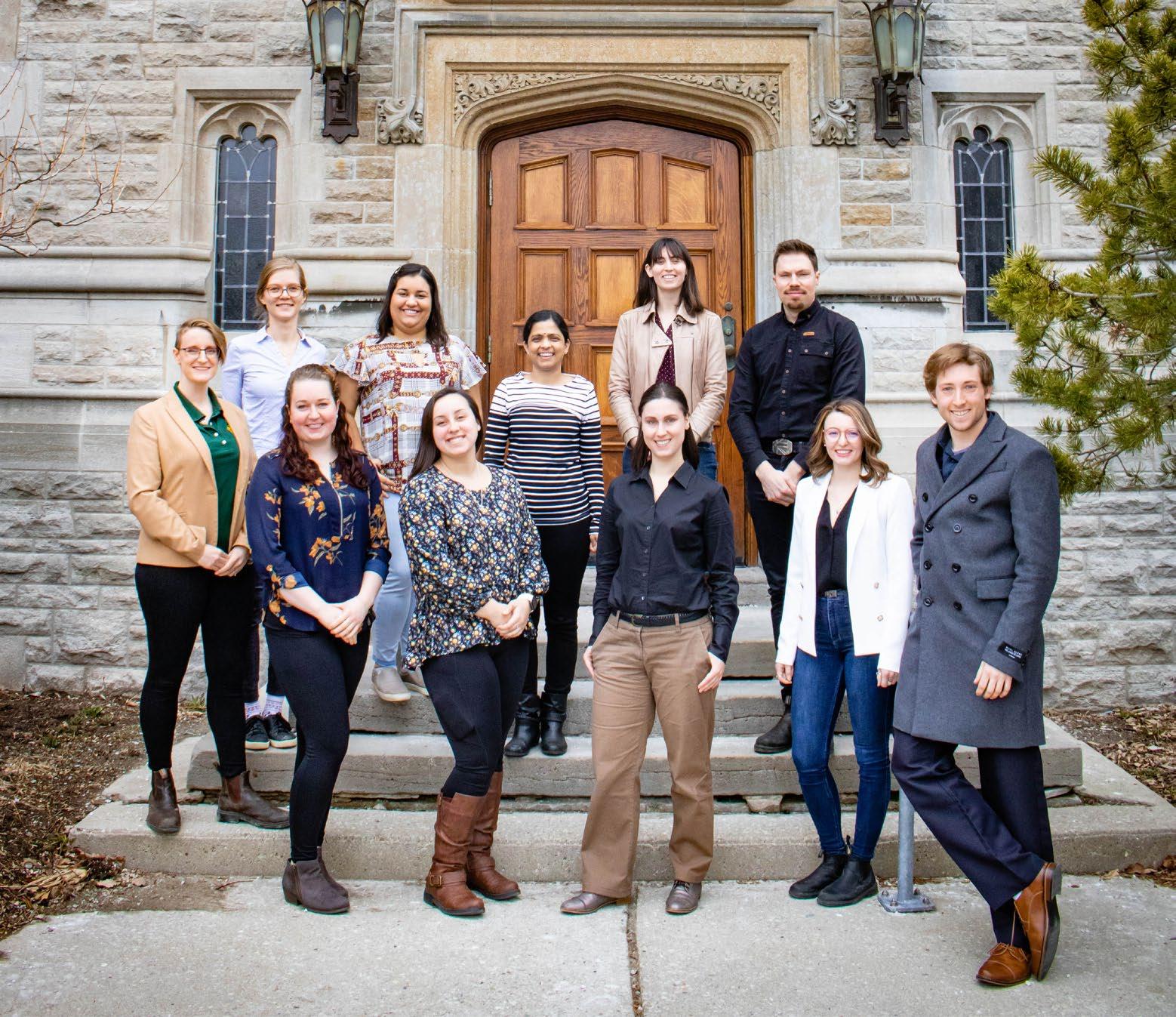

Awards Contact oacaward@uoguelph ca

Faculty advisors guide, inspire, and support their students to reach their scholarly potential The advisor promotes conditions conducive to a student’s research and intellectual growth, providing appropriate guidance on the progress of the research and the standards expected
Real world research, guided by real world researchers.
Graduate programs with a thesis or major research paper (MRP) component require a faculty advisor Thesis students should identify and confirm their faculty advisor prior to application, whereas major research paper students typically find an advisor after starting their program When reviewing and researching potential advisors, here are a few things to keep in mind:
• Are you interested in their research?
• Does their research align with your learning and career goals?
• What is their advising style?
• Is there funding available?
1 Explore the OAC faculty members page and identify potential professors you would like to work with
2 Reach out via email to request a meeting with potential advisors to discuss your research interests and future research project opportunities in their lab
3 Important information to include in your initial contact:
• Your academic and professional background (include your academic CV)
• Your research experience and interests
• Why you are interested in working with them
• If you have received or applied for any scholarships
Tip: Reach out to current graduate students who have worked with your potential advisor. This will give you the graduate student’s perspective on the lab and research.
“When looking for a faculty advisor set up meetings with multiple potential advisors to understand the research projects they offer. It is helpful when deciding between advisors to answer a) do I see myself working well with this advisor and, b) is the research project I would complete with them interesting and rewarding for me as a researcher?”
Chris Budd MSc, Plant Agriculture Alumni Field Biologist BASF Canada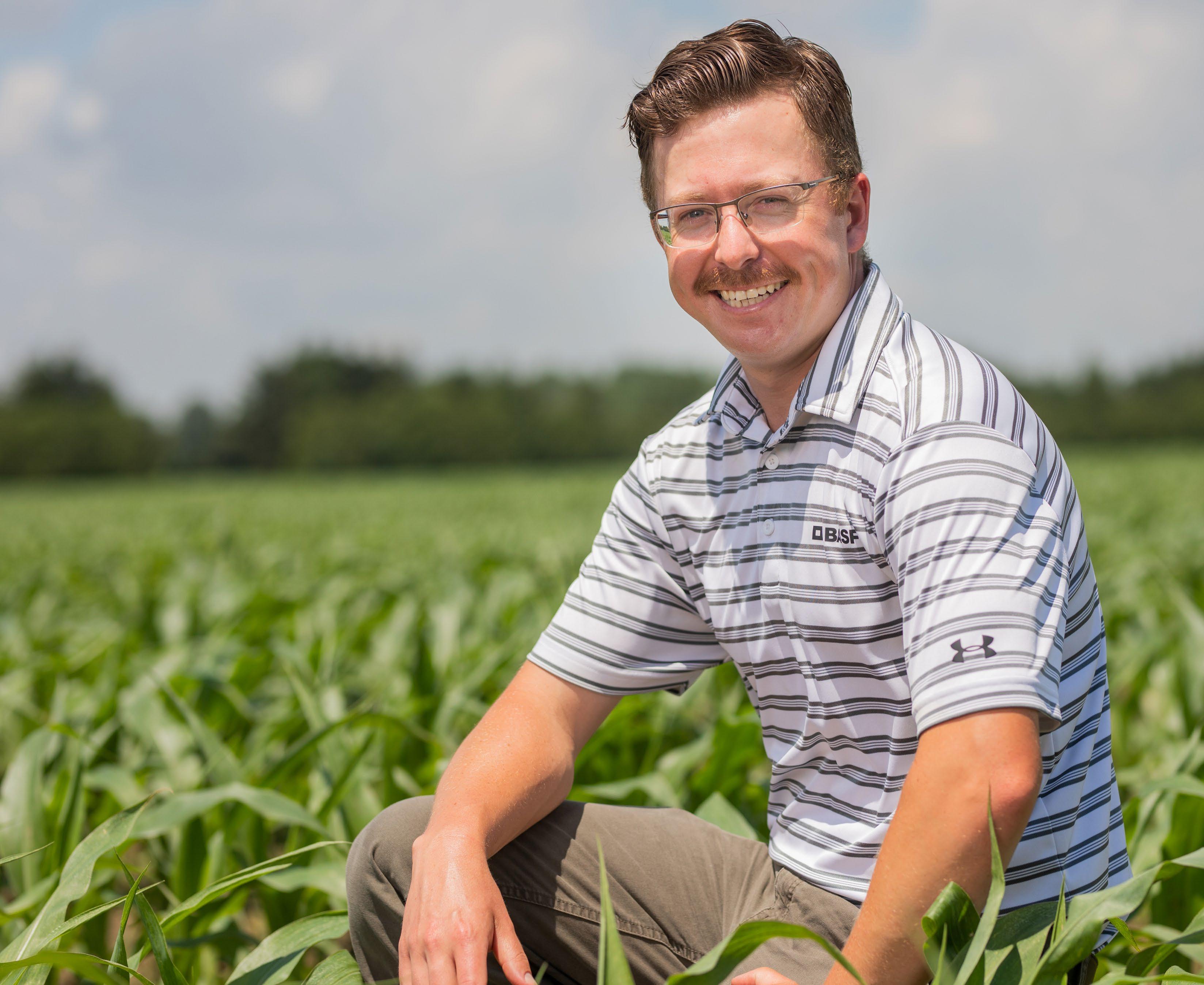
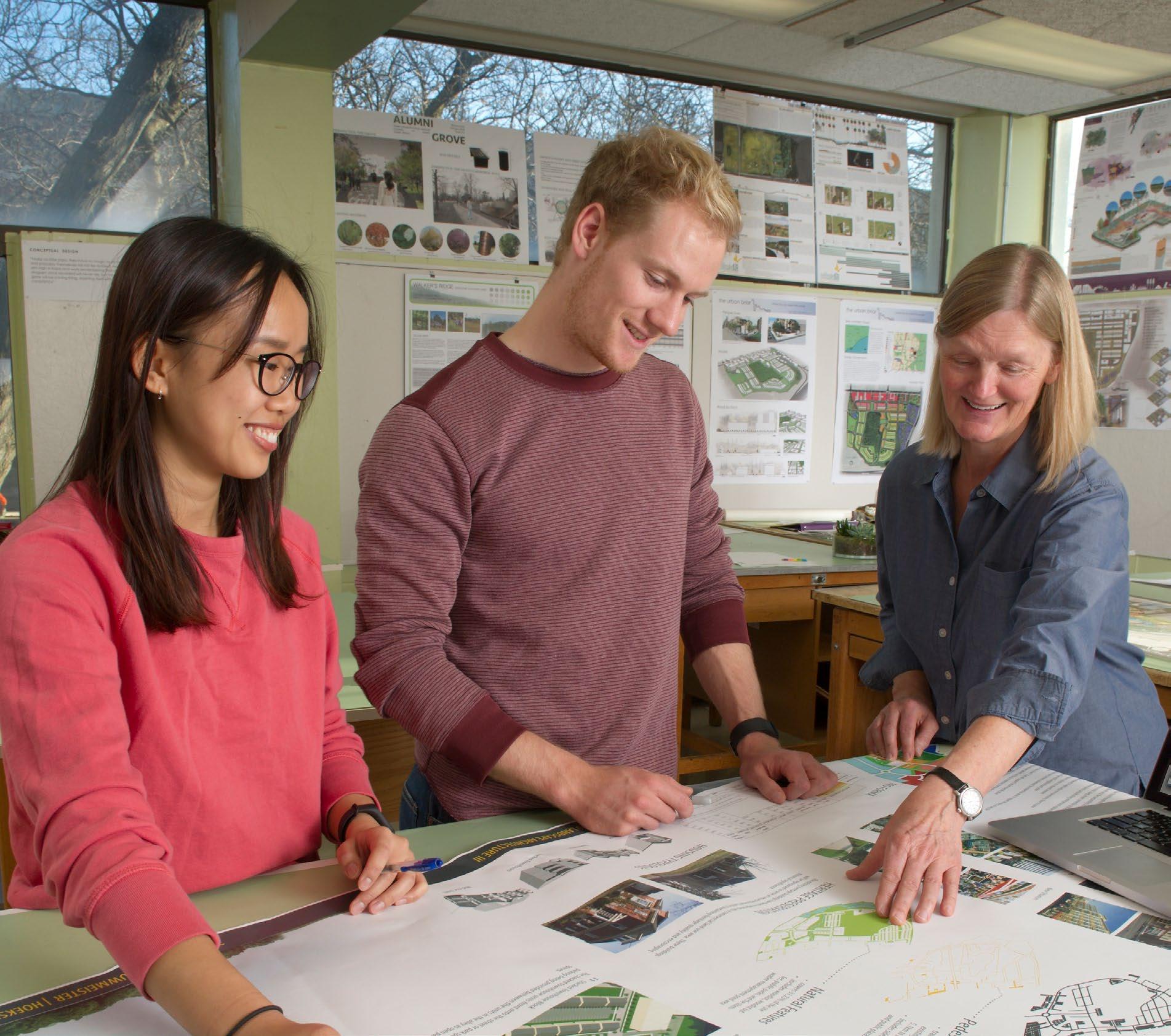
OAC prioritizes opportunities for graduate student development, wellness and building a strong student community
There are a multitude of opportunities for OAC graduate students to engage and develop their personal and professional networks, skills and knowledge, a few examples of which are outlined here
Come be a part of our thriving community and discover your place.
Grad Pathways is the University of Guelph’s resource hub specifically designed to support the academic, research, personal, and professional success of our graduate students and post-doctoral fellows


Find out more here
The 3 Minute Thesis competition assists students with building great communication skills by presenting their research and its wider impact in 3 minutes or less It challenges students to present complex research in an engaging, accessible and compelling way OAC gradu ate students have excelled with several winning not only the University-wide competition but both the provincial and national competitions as well
As a graduate student, you may broaden your horizons with the opportunity to visit or study at another institution in Canada or abroad The Ecuador field school (find out more about Field School here is just one of countless examples of the graduate student travel opportunities
Find out more here
OAC’s graduate student community has strong connections and countless opportunities to build your network through engagement with your graduate student councils Graduate Student Councils enhance student experience by hosting academic and social events throughout the year and promote an engaging and collaborative environment within departments
Find out more about OAC graduate clubs here
“I like presentations, teaching, and outreach, especially to different groups of people. If we as scientists can successfully communicate our knowledge in a way people understand and feel engaged with, they are more likely to share that information.”
PhD Plant Agriculture
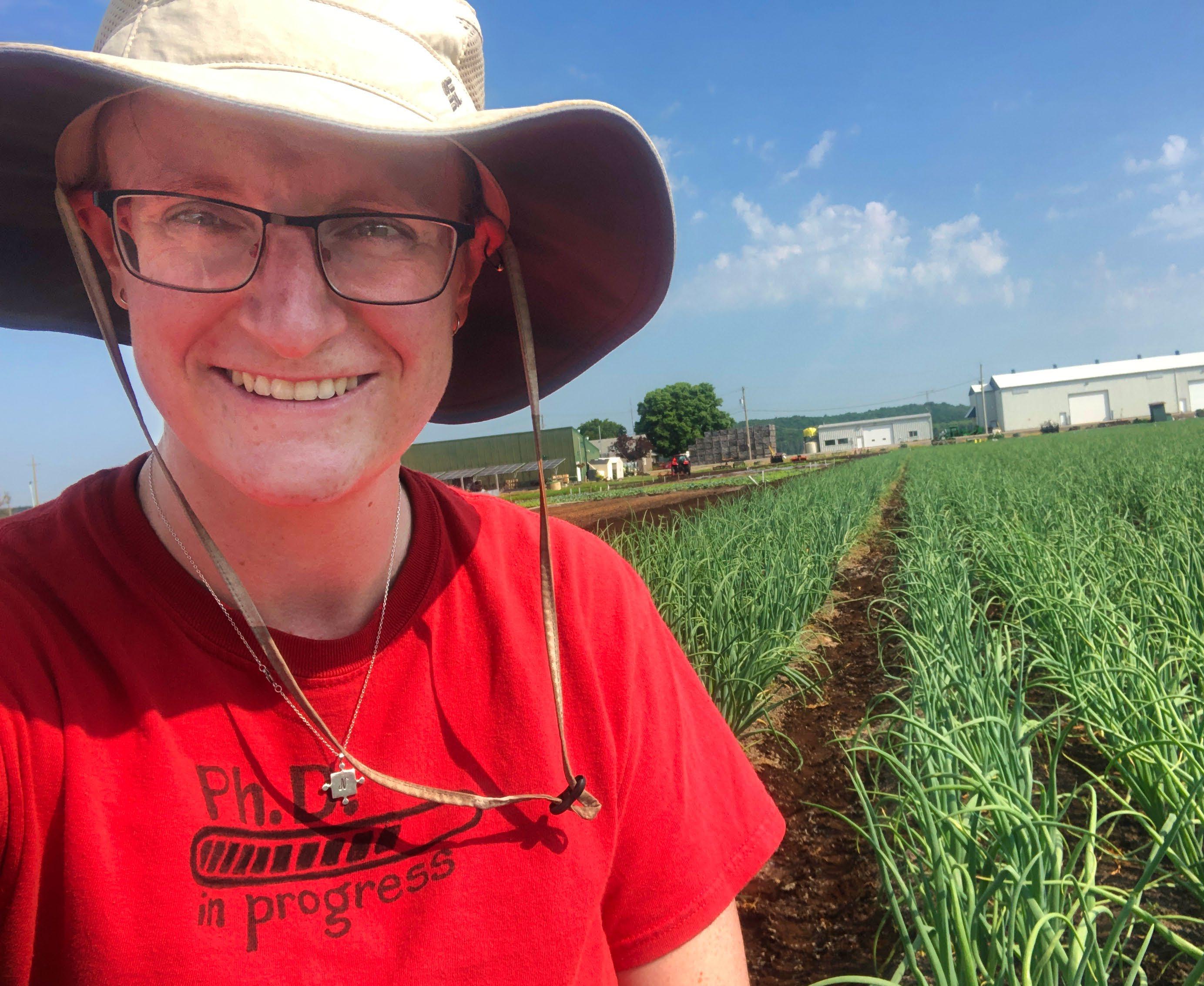
Alumni
Communications and Outreach Coordinator
Guelph Turfgrass Institute
2020 1st place in UofG 3MT competition, 4th place in provincial 3MT competition
Sara Stricker
“The OAC community provided me with the opportunity to work with a diverse group of people in terms of their gender, culture, race, interests, sexual orientations, and skills.”
Mohsen Yoosefzadeh Najafabadi PhD Plant Agriculture Alumni Research Associate Ontario Agricultural College Past Vice President Internal, Graduate Student Association

Welcome to one of Ontario’s fastest growing, best run cities: Guelph, Ontario With a population of over 135,000, you’ll get the feeling of a major community and the welcome of a smaller town The architecture is rich, the downtown core is vibrant, the legacy and cultural diversity is strong, and the community and campus are interconnected . To learn more about Life at Guelph visit graduatestudies.uoguelph.ca/about/life-guelph
Ridgetown Campus is located in southwestern Ontario (1 hour south-west of London, ON and 1 hour east of Windsor, ON) It is a safe, quiet, and friendly community of 3,500 people where you will get to see the bounty of local agriculture and small-town living
Climate
4 distinct seasons
Spring: mid-March to May 10° to 20° C (some rain)
Summer: June to August 20° to 30° C (humid)
Fall: September to November 7° to 20° C (some rain)
Winter: December to mid-March -15° to 2° C (snow, sunny)
Travel time by air to Toronto*
New York 1 hr
Vancouver 5 hrs
Bogota 6 hrs
London 7 hrs
Amsterdam 7.5 hrs
Frankfurt 7.5 hrs
Paris 8 hrs
Istanbul 10 hrs
Dubai 13 hrs
Beijing 13.5 hrs
Hong Kong 14.5 hrs
Delhi 16 hrs
Tehran 16.5 hrs
Port Louis 21 hrs
is a one-hour drive from Toronto’s Pearson International
Shuttle service can be arranged to bring you directly to
redcarservice.com
GO Bus transit connects the University Centre to the Greater Toronto Area and Mississauga, throughout the day during weekdays gotransit.com
Important Note: Amid the uncertainty around the COVID-19 pandemic, some programs, services and/or options offered at the U of G may change or be unavailable Continue to check admission. uoguelph.ca/admission-related-faqs-during-covid-19-pandemic for admission-related information, and news.uoguelph.ca/2019-nov el-coronavirus-information/ for all other University-related information
© 2021 The University of Guelph makes every effort to ensure the informa tion contained herein is as current as possible The University reserves the right to make changes to policies, programs and services described in this publication without prior notice .